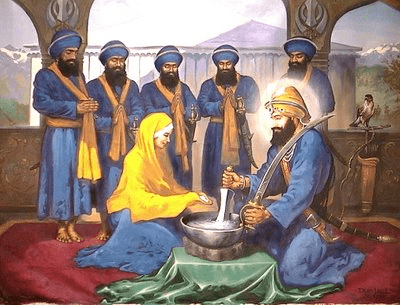
ਪੁੱਤ੍ਰ ਖਾਲਸਾ ਤੇਰੇ ਭਯੋ॥ਗੋਦ ਪਾਇ ਤੁਝ ਹਮ ਨੇ ਦਯੋ॥
Mata Sahib Kaur Ji, honoured as the Mother of the Khalsa, holds a sacred place in Sikh history. This divine title was blessed upon her by Guru Gobind Singh Ji, the Tenth Nanak, in recognition of her spiritual strength, grace, and lifelong devotion to the Khalsa Panth.
On the historic day of Baisakhi in 1699, when Guru Sahib established the Khalsa through the first Amrit Sanchar (baptism ceremony), Mata Sahib Kaur Ji performed a most blessed seva. She added pataasey (sweetness) to the Khande-di-Pahul to symbolize the balance of strength with compassion. This sacred act represents the eternal sweetness and humility within the warrior spirit of the Khalsa.
When a Sikh receives Amrit, they are told:
“From this day, your spiritual father is Guru Gobind Singh Ji, and your spiritual mother is Mata Sahib Kaur Ji…”
Throughout her life, Mata Sahib Kaur Ji stood by the Khalsa Panth valued. She guided the Sikh community with spiritual wisdom and leadership, issuing eight Hukamnamas in the name of the Khalsa.
Mata Sahib Kaur Ji was born on 1st November 1681 in Rohtas, District Jehlum (now in Pakistan). Her parents, Bhai Rama Ji and Mata Jasdevi Ji, raised her in a home of deep Sikhi values and seva. From childhood, she was gentle in spirit and devoted to Gurbani. Her spiritual connection to Guru Sahib was so deep that she dedicated her entire life to his service. When Guru Gobind Singh Ji travelled to Sri Hazoor Sahib, Nanded, he entrusted Mata Sahib Kaur Ji with five sacred weapons of Guru Hargobind Sahib Ji for safekeeping, now preserved at Gurdwara Rakab Ganj Sahib, Delhi.
Mata Sahib Kaur Ji attained Akal Chalāṇā (left for Sachkhand) in 1747 at the age of 66. Her antim sanskār (last rites) was performed with full Maryada at Gurdwara Bala Sahib, Delhi.





